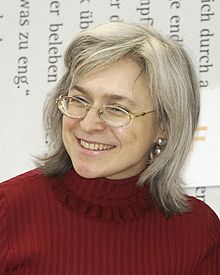Anna Politkovskaya
| Anna Politkovskaya Анна Политковская | |
|---|---|

Politkovskaya during a March 2005 interview in Leipzig, Germany
| |
| Born | Anna Stepanovna Mazepa (Ukrainian: Га́нна Степа́нівна Мазе́па) 30 August 1958 New York City, New York, U.S. |
| Died | 7 October 2006 (aged 48) Moscow, Russia |
| Resting place | Troyekurovskoye Cemetery, Moscow |
| Occupation | Journalist, writer |
| Nationality | Russian[1] |
| Citizenship | Russia, United States[2] |
| Alma mater | Moscow State University |
| Period | 1982–2006 |
| Subject | Politics, freedom of the press, human rights, social issues |
| Notable works | Putin's Russia: Life in a Failing Democracy, A Small Corner of Hell: Dispatches from Chechnya |
| Notable awards | Amnesty International Global Award for Human Rights Journalism 2001 |
| Spouse | Alexander Politkovsky |
| Children |
|
It was her reporting from Chechnya that made Politkovskaya's national and international reputation.[4] For seven years she refused to give up reporting on the war despite numerous acts of intimidation and violence. Anna was arrested by Russian military forces in Chechnya and subjected to a mock execution. She was poisoned while flying from Moscow via Rostov-on-Don to help resolve the 2004 Beslan school hostage crisis, and had to turn back, requiring careful medical treatment in Moscow to restore her health.
Her post-1999 articles about conditions in Chechnya were turned into books several times;[5] Russian readers' main access to her investigations and publications was through Novaya Gazeta, a Russian newspaper known for its often-critical investigative coverage of Russian political and social affairs. From 2000 onwards, she received numerous international awards for her work. In 2004, she published Putin's Russia, a personal account of Russia for a Western readership.[6]
On 7 October 2006, she was murdered in the elevator of her block of flats, an assassination that attracted international attention.[7][8][9] In June 2014, five men were sentenced to prison for the murder, but it is still unclear who ordered or paid for the contract killing.[10]
Comments
Post a Comment